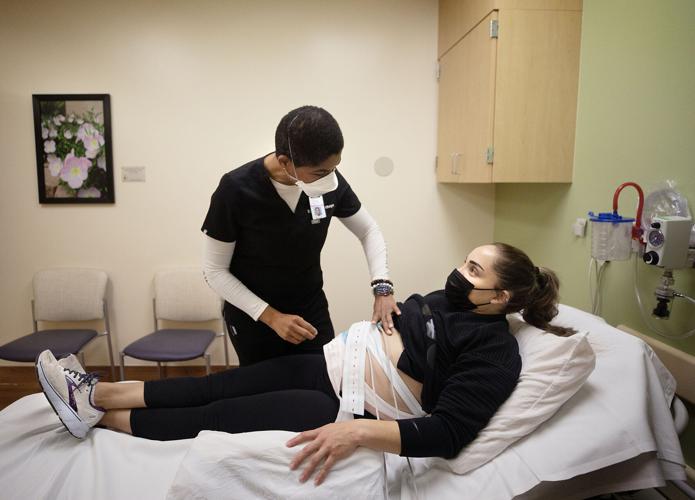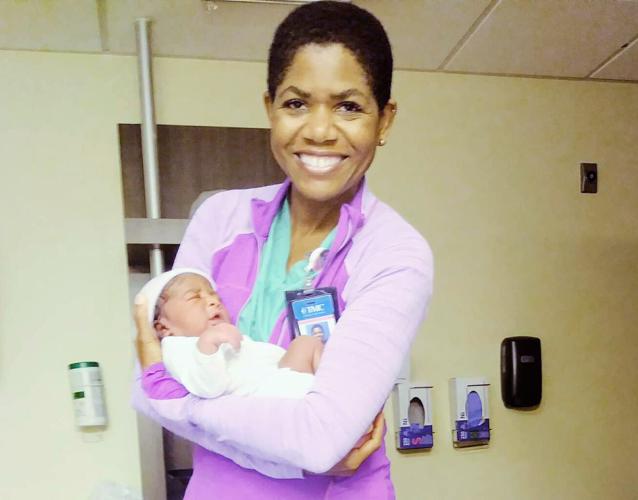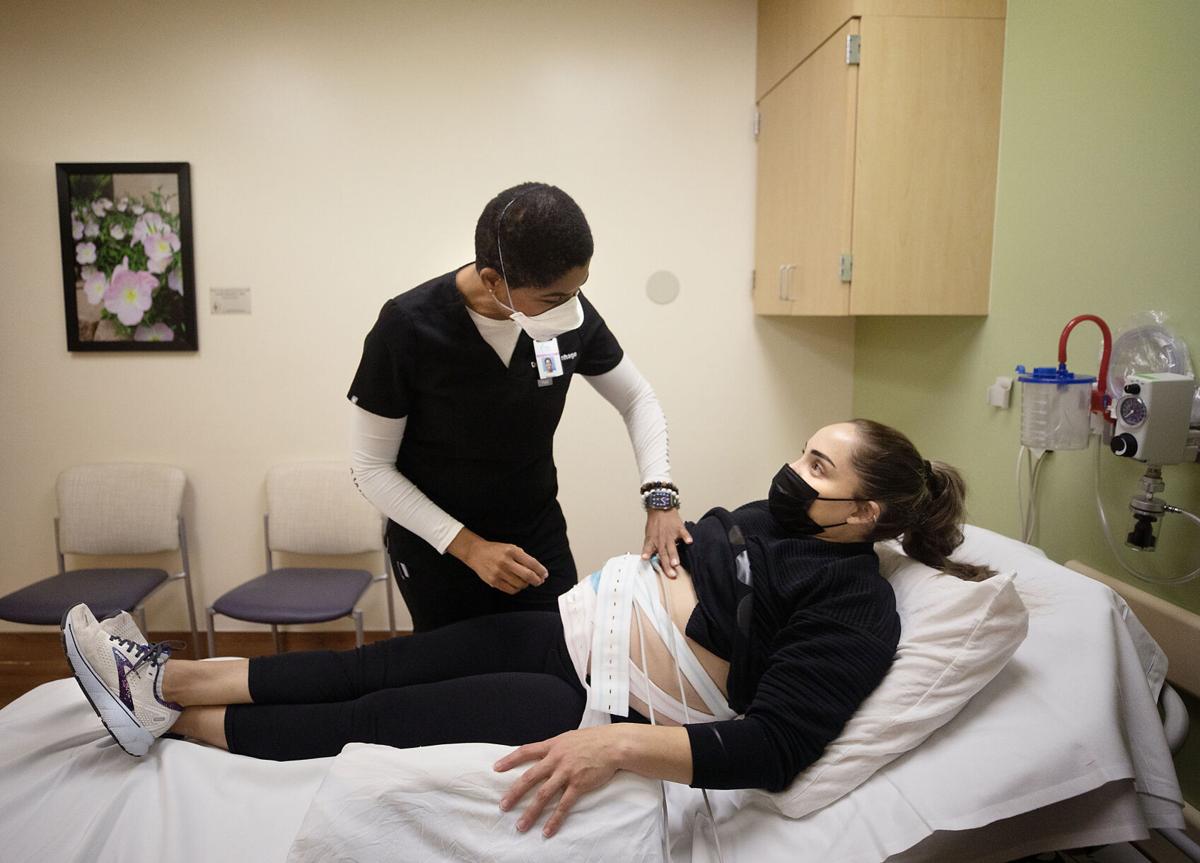Janet Easley has two healthy sons now but, before they arrived, she wasn’t sure having a baby was going to be possible.
Easley had several miscarriages before becoming pregnant with her oldest child. She now credits two safe deliveries to the care she received from her current physician, Dr. Monique Schoenhage, with Tucson Medical Center Labor & Delivery.
“I came to their center high risk,” Easley said of the months leading up to her November 2018 delivery. “I had already lost three babies, three boys.”
TMC was recently named one of the country’s best labor and delivery hospitals for the second year in a row. The medical center, at 5301 E. Grant Road, has one of the state’s highest delivery rates, and currently handles the most births in Southern Arizona, with roughly 5,500 babies born during 2022 and 5,120 in 2021.
In comparison, there were 1,600 babies born at Northwest Medical Center in 2021 — 2022 numbers aren’t available yet — and an anticipated 2,700 born at Banner University Medical Center-Tucson for 2022, with 2,477 born there in 2021.
During the pandemic, the birth rate dropped significantly, with the Brookings Institute reporting 60,000 so-called missing births nationwide between October 2020 through February 2021.
Births returned to pre-pandemic trend levels in March 2021, indicating that conceptions returned to pre-pandemic trend levels in June 2020.
Data is still pending on births that would have been conceived during the 2020-2021 winter of the pandemic, so Brookings is not yet able to estimate the actual size of the “COVID-19 baby bust.”
Best of two worlds
For Easley, having the support she needed was a great relief.
“What I love about that (TMC) center is that, while you have one doctor, all of them know what’s going on with you,” Easley said. “Everyone, from the receptionists to the doctors, played a part in our journey. We’d been through so much already.”
Nearly 650 hospitals providing delivery services were evaluated by U.S. News & World Report as part of an analysis recognized by the National Institutes of Health. TMC was one of fewer than 300 hospitals nationwide receiving a “high performing” designation, the highest a delivery hospital can earn.
The obstetrics and gynecology rating for the study is based on several categories, including survival rates, volume of high-risk patients, patients’ experiences, nurse staffing, and advanced clinical technologies. Other considerations include C-section rates in lower-risk pregnancies, newborn complication rates, exclusive breast milk feeding rates, and early elective delivery rates.

Dr. Monique Schoenhage holds the newborn son of Janet Easley at Tucson Medical Center Labor & Delivery in November 2018.
Schoenhage specializes in maternal and fetal medicine, and has worked at TMC off and on since 2003, leaving once to live overseas and another time to work in Phoenix.
Both times, she returned to TMC because, she says, “their labor and delivery program is exceptional.”
Nurse staffing was one of TMC’s noted strengths on the national report. Keeping enough nurses is a challenge for many medical facilities now, following the pandemic. While TMC is “not immune to the downturn,” Schoenhage said, “the quality of our nursing staff is outstanding.”
“When you are the premiere delivery place in the community, trained and professional people want to come work with you,” she said.
Another feature Schoenhage said she loves is their midwifery center, which provides “the best of two worlds.”
Patients can work with a midwife, she said, and have a home birth kind-of-experience while also having the safety of the hospital there if needed.
The center, formerly El Rio Birth Center, is an accredited birth center that’s been in Tucson since 1982. Expectant mothers who pick this option can work toward a birth free of medical intervention.
‘Happy, healthy little boy’
Easley’s oldest, who turned 4 n November, was delivered by cesarean section at 37 weeks, and they were able to go home within a couple of days. Her second son, who will be two in February, was born early, and was in neonatal intensive care for several months before going home.
That second pregnancy went along smoothly until a few weeks before he was born, Easley said. He’d been moving a lot, and then that stopped.
She was hospitalized for two weeks before he was born, then went home for a week before he was delivered by emergency c-section at 32-weeks.
“He went into surgery less than 24 hours after he was born,” she said. “He had a hole in his intestine.”
Today?
“He’s a happy, healthy little boy,” she said.
While partnering on a virtual reality training scenario, Ash Watkins, left, clinical trainer, and Shane Elfering, registered nurse, get set up for a virtual reality training scenario at Tucson Medical Center in Tucson, Ariz. on June 27, 2022. TMC, in partnership with 3lbXR, is piloting a new virtual realty training program for nurses, patient care technicians and environmental services staff aimed at addressing high-risk and problematic tasks as well as work responsibilities in a health care setting.
Photos: Virtual reality training for nurses at Tucson Medical Center
VR training for nurses
Updated
Sherilyn Wollman, registered nurse, pics up an item while working on a virtual reality training scenario during a VR training at Tucson Medical Center on June 27, 2022.
VR training for nurses
Updated
While partnering on a virtual reality training scenario, Ash Watkins, right, clinical trainer, looks toward Shane Elfering, registered nurse, who reacts to a task Watkins did during a VR training at Tucson Medical Center in Tucson, Ariz., on June 27, 2022.
VR training for nurses
Updated
Chris Castaldi, 3lbXR technical director, demonstrates how to use a virtual reality training scenario during a VR training at Tucson Medical Center in Tucson, Ariz. on June 27, 2022.
VR training for nurses
Updated
Registered nurses Sherilyn Wollman, right, and Trisha Douglass put on their virtual reality headsets during a VR training at Tucson Medical Center in Tucson, Ariz. on June 27, 2022.
VR training for nurses
Updated
Nancy Berrones, registered nurse, along with other registered nurses and Tucson Medical Center staff, watch as Chris Castaldi, 3lbXR technical director, demonstrates how to use the virtual realty training during a VR training at Tucson Medical Center in Tucson, Ariz. on June 27, 2022.
VR training for nurses
Updated
Ash Watkins, left, clinical trainer, gets used to the virtual reality headset while Tucson Medical Center registered nurses put on their VR headsets during a VR training at Tucson Medical Center in Tucson, Ariz. on June 27, 2022.






